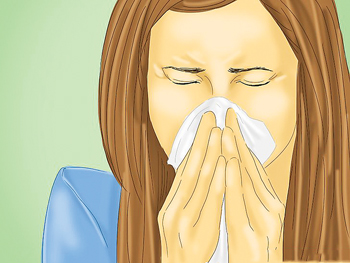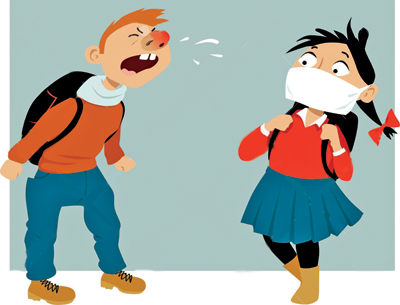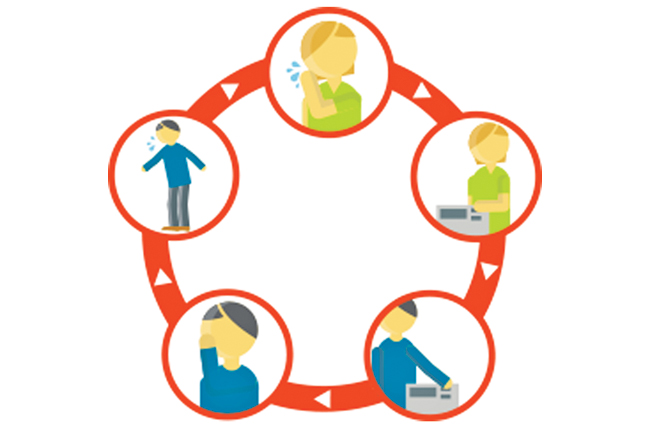According to the Information offered to the public through the Health Ministry, the Epidemiology Unit and Medical Research Institute (MRI) medical experts, Influenza viruses cause seasonal influenza infection or ‘flu’ among us. The two influenza seasons are from November to February and from April to June. None of them are new or novel viruses and have been seen circulating in the country during the last few years. Therefore it is common to find that varying degrees of protective immunity against these viruses had been developed among us.
 Although ‘flu’ is usually a mild respiratory illness with fever, cough and cold which resolves on its own for most of the people, certain groups of people are at higher risk for developing severe disease e.g pneumonia. These are older people (65 years or above) or very young children (less than two years), pregnant women, people with suppressed immunity and those with chronic heart, liver, kidney and metabolic diseases. Persons who underwent major surgeries should take precautions. People with flu’ especially these high-risk groups, should take measures to seek medical attention if their ‘flu’ gets worse or if they develop difficulty in breathing despite treatment.
Although ‘flu’ is usually a mild respiratory illness with fever, cough and cold which resolves on its own for most of the people, certain groups of people are at higher risk for developing severe disease e.g pneumonia. These are older people (65 years or above) or very young children (less than two years), pregnant women, people with suppressed immunity and those with chronic heart, liver, kidney and metabolic diseases. Persons who underwent major surgeries should take precautions. People with flu’ especially these high-risk groups, should take measures to seek medical attention if their ‘flu’ gets worse or if they develop difficulty in breathing despite treatment.
Public are encouraged to take general personal hygienic measures to prevent spread of respiratory infections and seek medical attention for flu’ if in a high risk group or when feeling ill.
 There is no place for undue panic and concern since this seasonal influenza virus infection is not caused by a new/novel virus or is not an unknown/strange disease condition. All possible measures to equip health institutions to handle influenza patients had been taken by the Ministry of Health a long time ago.
There is no place for undue panic and concern since this seasonal influenza virus infection is not caused by a new/novel virus or is not an unknown/strange disease condition. All possible measures to equip health institutions to handle influenza patients had been taken by the Ministry of Health a long time ago.
According to the WHO sources, Influenza is a viral infection that affects mainly the nose, throat, bronchi and, occasionally, lungs. Infection usually lasts for about a week, and is characterized by sudden onset of high fever, aching muscles, headache and severe malaise, non-productive cough, sore throat and rhinitis. The virus is transmitted easily from person to person via droplets and small particles produced when infected people cough or sneeze.
Most infected people recover within one to two weeks without requiring medical treatment. However, in the very young, the elderly, and those with other serious medical conditions, infection can lead to severe complications of the underlying condition, pneumonia and death.
Symptoms
There are certain signs and symptoms of seasonal influenza. They are, sudden onset of high fever, cough (usually dry), headache, muscle and joint pain, severe malaise (feeling unwell), sore throat and runny nose. Cough can be severe and can last two or more weeks. Most people recover from fever and other symptoms within a week without requiring medical attention. But influenza can cause severe illness or death especially in people at high risk. The time from infection to illness, known as the incubation period, is about two (2) days.
Prevention
 Seasonal influenza spreads easily. When an infected person coughs, infected droplets get into the air and another person can breathe them in and be exposed. The virus can also be spread by hands contaminated with influenza viruses. To prevent transmission, people should cover their mouth and nose with a handkerchief or tissue when coughing and sneezing, and wash their hands regularly with soap and water.
Seasonal influenza spreads easily. When an infected person coughs, infected droplets get into the air and another person can breathe them in and be exposed. The virus can also be spread by hands contaminated with influenza viruses. To prevent transmission, people should cover their mouth and nose with a handkerchief or tissue when coughing and sneezing, and wash their hands regularly with soap and water.
Other methods of prevention
Various local and foreign health professionals also recommend further prevention methods. Reasonably effective ways to reduce the transmission of influenza include good personal health and hygiene habits such as: not touching eyes, nose or mouth, frequent hand washing or clean hands with alcohol-based hand rubs, avoiding spitting in public places is also recommended. Smoking raises the risk of contracting influenza, as well as producing more severe disease symptoms. Since influenza spreads through both aerosols and contact with contaminated surfaces, surface sanitizing may help prevent some infections. Alcohol is an effective sanitizer against influenza viruses.
 Large respiratory droplets containing pathogens like influenza can travel up to six (6) feet when a sick person coughs or sneezes, according to the CDC. Droplet transmission occurs when bacteria or viruses travel on relatively large respiratory droplets that people sneeze, cough, drip, or exhale. These droplets are loaded with infectious particles.
Large respiratory droplets containing pathogens like influenza can travel up to six (6) feet when a sick person coughs or sneezes, according to the CDC. Droplet transmission occurs when bacteria or viruses travel on relatively large respiratory droplets that people sneeze, cough, drip, or exhale. These droplets are loaded with infectious particles.
Bacteria in your coughs and sneezes can stay alive in the air for up to 45 Minutes. Researchers have developed a new technique to study how a common disease causing bacterium can spread and remain in the environment after coughing or sneezing – and the results are not pretty.
Cold viruses have been shown to survive on indoor surfaces for approximately seven days. Flu viruses, however, are active for only 24 hours. Viruses that cause influenza can survive in the air as droplets for hours and live on hard surfaces like phones and keyboards for up to 24 hours. Infectious flu viruses clinging to a tissue can last for about 15 minutes, but viruses on the hands tend to fade quickly.







